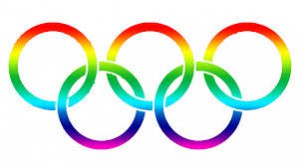Sochi – And Far Beyond

It’s almost impossible not to be moved by the artistry and images of the Olympic Games – not to mention skating commentator Johnny Weir’s outfits – but this time around, it’s all felt different. The Sochi Games have come to symbolize much more than athletic competition. Through a combination of overt host-country anti-LGBT hostility and savvy activism, Sochi has become a kind of coming out for global LGBT rights. Perhaps never before has the question of our rights had such prominence on the world stage.
LGBT rights and the Olympics
LGBT rights and the Olympics have been linked before. Back in 1982, in one of San Francisco’s many “LGBT firsts,” the inaugural Gay Olympics took place in Golden Gate Park’s Kezar Stadium. The International Olympic Committee infamously sued to bar organizers from using “Olympics” – and thus were born the Gay Games. (Side-note: Horizons is proud to have made the very first foundation grant to the Gay Olympics/Games that same year.)
That was a very different time. While the “Gay Olympics” controversy certainly got attention, it wasn’t by any means all supportive. In fact, even the concept of LGBT athletes remained quite radical back then.
With President Obama sending openly LGBT athletes to represent the country, we’ve clearly come a long way. But it’s not as though the whole world has joined in condemning Russia’s anti-LGBT laws and policies. Hardly. Plenty are silent or vocally supportive. Worse, the anti-LGBT actions of the Russian government show no sign of abating. The fact that during the Games themselves, Russia’s president signed an anti-LGBT adoption bill certainly suggests how little they seem to care about any international criticism.
Two worries beyond Sochi
That raises one of the two major worries I have about what happens after Sochi. To the degree that the government’s stance proves politically popular there, the future looks bleak at best for LGBT Russians.
My second major worry is this: that with all the attention being paid to Russian LGBT rights (or the lack thereof), too many of us will ignore or forget about LGBT people in the many, many countries where things are even worse than in Russia. Recent news about rising violence and pervasive discrimination in Nigeria is downright terrifying. Uganda’s President has said he’ll sign a draconian anti-gay measure. At the very end of 2013, India’s Supreme Court issued a surprise ruling that reinstated that country’s anti-sodomy law.
What we can do
It’s easy to feel helpless when events happen so far away. But we’re not helpless, and almost certainly the simplest and most direct way we can help is by donating, whether our gifts are large or small. One option is the Russia Freedom Fund, which directly supports LGBT organizations in Russia. Another possibility is to donate to ORAM, which is helping resettle LGBT refugees in the Bay Area, or to the Russia-specific LGBT Russian Refugee Fund that’s been established by a coalition of groups at Horizons Foundation, also to help LGBT Russians seeking refuge in the Bay Area. And for the rights of LGBT around the world, there’s the International Gay & Lesbian Human Rights Commission, which advocates for LGBT causes both with international entities like the United Nations and directly supports LGBT work “on the ground” in countries around the world. (Full disclosure: I’m a member of IGLHRC’s board of directors).
We must not let Sochi be the high-water mark of attention to global LGBT rights. I’m confident that we won’t, but that will take a lot of work, a lot of money, and, unfortunately, probably a lot of time.


